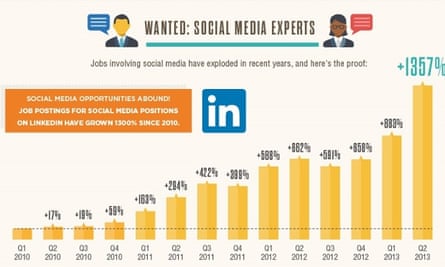More than 5 million people on LinkedIn claim to be social media experts, while social media job vacancies have proliferated at a blistering rate of 1,357% since 2010. So, how do you stand out and prove your expertise in this highly competitive marketplace?
Most recruiters seem to agree there is one element to trump them all – experience.
Stuart McClure, head of marketing at digital recruitment agency Propel London, says: “Courses and qualifications are valuable for your own knowledge but nothing compares to proven work experience.”
He said employers are looking for candidates that can demonstrate evidence of having gained traction – increased engagement metrics such as followers, likes, comments, re-posts – for a real, social media case study.

However, Mike Cornwell, chief executive of the Institute of Direct and Digital Marketing (IDM), which launched the first digital marketing qualification in partnership with Google in 2005, says: “The marketers with little digital experience who were simply blagging it are being found out. It’s not about qualifications for their own sake, but about enabling people to do their jobs properly. It’s also about building confidence.”
First-jobbers v marketing managers
Cornwell says social media qualifications are ideal for three groups of professionals:
- People coming out of university, whether marketing-related or not, who want to make themselves more attractive to employers.
- People who have been marketing generalists who then wish to specialise, or vice versa – often for a promotion or with a new role in mind.
- People aged 40 or over who came into the marketing industry at a time when they hadn’t needed to practise digital and have now reached a level that they realise the importance of gaining digital skills. Often this group are recruiting a digital team or managing digital agencies and need to ensure they are receiving a competitive return-on-investment.
Cornwell adds: “For businesses that subsidise IDM qualifications for their employees, it’s about the return on investment, making them more accountable marketers. The more people that practise [social media/digital marketing] professionally, the better for the industry.”
Harry Thuillier, head of marketing at Squared Online, which offers Google-developed courses, says: “We find a large proportion of our participants actually have five or more years of marketing under their belt. So I would agree – experience is vital. But our students find that Squared offers a wider strategic digital context, a network of digital peers, and an emphasis on learning by doing that they can apply to their day to day roles and in many cases, their management of digital and social teams.”
Thuillier says the average age of its participants is 32, over half of whom are marketing managers at brands, SMEs or agencies; only 10% are director-level professionals and even fewer, 6%, are recent graduates with less than a year’s experience.
But with such a plethora of courses available – from degrees through to online certificates – should you go for a specific social media qualification rather than a more general digital marketing course? Which courses and qualifications are worth your investment?
Which qualification? Social, Digital or something else entirely
Mary Thomas, social media and Microsoft Office trainer and owner of Concise Training, says: “There is no right way of ‘doing’ social media, but there are lots of people doing it badly out there. The City & Guilds ITQ Social Media qualification provides hands-on experience of using the digital tools in a safe way, accompanied with individual feedback on the ways of doing it. Other courses may focus on how to ‘do’ social media in theory, rather than actually doing it in practice.”
Interestingly, Adam Round, recruitment consultant at The Digital Recruitment Company, says “a strong degree in journalism is a good starting point for the junior social media roles”, because of the nature of content production and its relationship to social media management. However, Round says, in fact “digital marketing is the best to be in if you don’t have any qualifications as it’s so much about experience”.
Victoria McKevitt, director of digital marketing agency, iProspect, agrees that “social is getting more integrated and less siloed”. As such, she says social media marketing now requires “a lot of rounded skills and abilities such as an understanding of brand, marketing or communications planning, writing and good design/aesthetic judgment. In addition, the ability to gain insights and analyse social performance and business results, along with the ability to generate ideas.”
Qualifying for a role on social or digital marketing
Current job descriptions for social media professionals, as advertised on LinkedIn, indicate a combination of communications, technical and digital analytical skills and experience are highly sought after. Social media marketing today is about so much more than community management, requiring a more sophisticated blend of online interactive communications skills and technical, digital marketing proficiency.
As result of social media maturing, the content for social media marketing courses has been adapted and morphed into a fuller, more comprehensive digital marketing approach. Most courses include email marketing, viral marketing, affiliate marketing, online PR, search engine optimisation (SEO), pay per click (PPC), marketing analytics and social media.
What to consider:
- Is the course accredited? Are CPD hours applicable? Learning and development and HR departments welcome this.
- Is there a combination of offline and online learning?
- Is there an option for progressing through qualifications and apply credit to advanced courses?
- Read testimonials for the course.
- Find out how the course material is compiled, who forms the committee to ensure material is up-to-date and academically rigorous as well as practical.
With a plethora of social media qualifications to choose from, here is a lowdown of the ones to consider:
Academic degrees:
Type of qualification: Social media master of arts (MA)
USP: The course is accredited by Creative Skillset
Starting price: £6,000 a year
Type of qualification: Social media master of arts (MA)
Starting price: £7,000 a year
London Metropolitan University
Type of qualification: Social media bachelor of arts (BA) degree course
Starting price: £9,000 a year
Type of qualification: Digital marketing and social media BA (Hons) degree course
USP: This three-year, full-time course offers a professional qualification from the Institute of Direct Marketing.
Starting price: £9,000 a year
Industry association qualifications:
The Digital Marketing Institute
Type of qualification: Professional diplomas, postgraduate diplomas and a masters in digital marketing. The social media marketing diploma will be available in autumn 2014 and the price will be £1,995.
USP: Syllabus Advisory Council (members include Facebook, Twitter, Microsoft and Google) update its content and courses
Starting Price: £349
The Institute of Direct and Digital Marketing (IDM)
Type of qualification: Certificate in social media (Cert SocM)
USP: Two-day intensive.
Starting Price: £1,445 for members
The Chartered Institute of Marketing (CIM)
Type of qualification: Diploma in digital marketing
USP: All certificates and diplomas have a digital element
Starting Price: £3,400 per 40-unit course, plus CIM (£50) and CAM Affiliate membership (£144)
Type of qualification: City & Guilds ITQ certificate in social media
USP: Practical course of 180 online hours, comprised of 20 modules. Nationally recognised IT user qualification
Starting Price: £999
Certificate courses:
Type of qualification: Certificate in digital marketing
USP: Endorsed by Google and certified by the IPA
Starting Price: £1,449
Type of qualification: 10-week course in digital marketing
USP: Face-to-face learning
Starting price: £2,800
Type of qualification: Various certificates
USP: Use its Training Navigator to decide which e-consultancy course fits best
Starting price: £550
Online courses:
Type of qualification: Hootsuite certificate
USP: Accredited to Hootsuite’s popular social media management software and provides practical social media examples from brands
Starting price: $21 a month
Type of qualification: Inbound Certificate & Hubspot Design Certificate (other certificates available to Hubspot members/partners only)
USP: Accredited to in-bound marketing specialists Hubspot
Starting price: £140 a month
Type of qualification: Massive open online courses (MOOCs) vary considerably in their content, timeliness, quality and learning outcomes.
Note: MOOCs typically have a fairly low completion rate of 5% to 15% compared with 80% to 95% for paid courses, which sometimes lowers their reputation with employers
Starting price: Free
More info: Coursera, FutureLearn, or search “social media MOOC”
Anna Marsden is a digital specialist, trainer and co-director of boutique media communications agency, Social i Media. Follow her on Twitter: @SocialiMediaUK

Comments (…)
Sign in or create your Guardian account to join the discussion